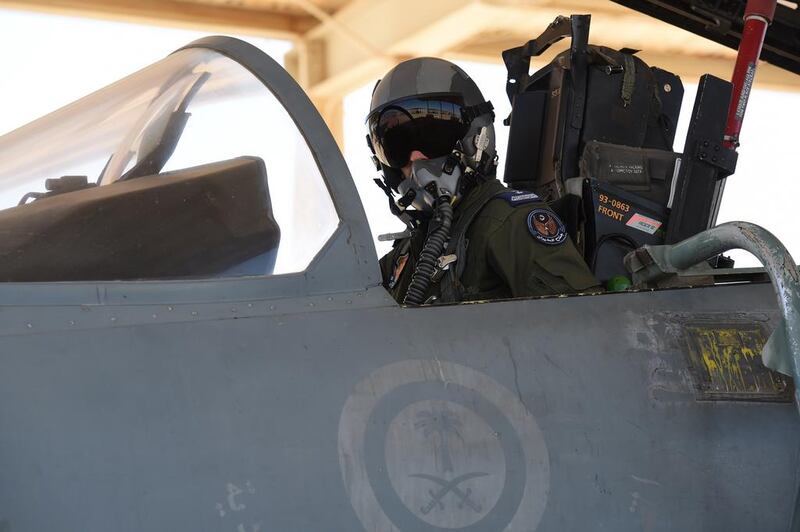The Arab Coalition fighting the Iran-backed Houthi rebels in Yemen said it will no longer use American in-flight refuelling since it has developed its own capabilities to do so.
In a statement to the Saudi Press Agency, the decision follows a request from coalition members to end the practice because of growing independence in refuelling aircraft in mid-air.
“The Kingdom of Saudi Arabia, and the member countries of the coalition to support legitimacy in Yemen, continually pursue improvements to military professionalism and self-sufficiency,” it said.
“Recently the Kingdom and the coalition has increased its capability to independently conduct in-flight refuelling in Yemen. As a result, in consultation with the United States, the coalition has requested cessation of in-flight refuelling support for its operations in Yemen.”
Pentagon chief Jim Mattis said the United States supported Saudi Arabia's decision to cease American aerial refuelling.
"The US will also continue working with the coalition and Yemen to minimise civilian casualties and expand urgent humanitarian efforts throughout the country," the US defence secretary said.
The Pentagon provided refuelling capabilities for about 20 per cent of the planes flying sorties over Yemen.
Mr Mattis last month made a surprise call for a ceasefire in Yemen and urged warring parties to enter into negotiations within the next 30 days.
The United Nations has now pushed that deadline back to the end of the year.
The coalition reiterated its hope that the UN-sponsored negotiations with the Houthi rebels in a third country, possibly Sweden, would “lead to a negotiated settlement” and “end the aggression” of the militias that have overrun urban centres in Yemen since 2014.
_________
Read more:
Coalition strikes at rebel-held air base in Yemeni capital
Yemen government welcomes push for peace talks with rebels
_________
Saudi Arabia and its allies intervened in the conflict between Yemeni President Abdrabu Mansur Hadi, whose government is recognised by the United Nations, and the Houthis, in March 2015.
The coalition decision to rely on its own in-flight refuelling capabilities came as Yemeni government forces made further gains in the rebel-held port city of Hodeidah.
The Yemeni Joint Resistance on Friday took full control of the May 22 Hospital on Al Khamseen Street in the north-east of the city, amid a major collapse of the Houthi militia's defences, Wam news agency reported.
It said that the Houthis had been using the May 22 Hospital as a military barracks, using medical staff as human shields in a violation of international law.
Yemeni forces managed to kill or capture dozens of Houthi fighters, who lost their strategic positions within the city.
The Yemeni Joint Resistance forces took full control of new strategic areas in western areas of Hodeidah, while continuing their advance towards As Saleh city, in the east of Hodeidah.
Yemeni engineering teams seized and dismantled Iranian-made mines and booby traps planted by the Houthi militia to slow the advancing forces. Some of the mines were hidden in bags of sugar and rice or in fire extinguishers, SPA reported.
Meanwhile, troops from the National Resistance, led by Maj Gen Tariq Saleh and the Al Mehdhar battalion of the Al Amalikah Brigades, took over large areas in eastern Hodeidah, recapturing a dairy plant and advancing towards Jazan Street along the road linking Hodeidah to Saudi Arabia, about three kilometres from the ports, according to a resident.
Abdulwahab Al Shoubail, who reports on the situation in the city on social media, told The National that the joint forces were advancing steadily, despite numerous mines and rebel snipers positioned on rooftops in the city.
"The Houthi forces are depleted. They have no forces fighting face to face on the ground but they are counting on the snipers and landmines," Mr Al Shoubail said.
"They are also using civilians trapped in the city as human shields. They prevent them from fleeing the city because they know that the coalition is keen to keep them safe, so they keep firing from residential areas in the city centre."
The capture of the main Hodeidah port and the smaller Al Saleef port "is a matter of time, no more", he said. "The joint forces are very close to them, but they are paying a lot of attention to the civilians and to avoiding damaging the ports."
In the Houthi stronghold of Saada in northern Yemen, government troops reported their biggest success so far in the province's Marran district where rebel leader Abdulmalik Al Houthi is thought to be in hiding.
A source in the 3rd Brigade of the Yemeni Army told the SPA that 200 fighters had been killed during attacks on rebel positions in the district in recent days.
Government forces launched operations in Marran in August. Much of the modern weaponry the rebels looted from army bases after their uprising is believed to be stored in the district.





